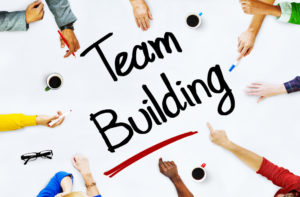How HR can influence employee teamwork
Research shows employee collaboration is a goal for most organisations, while the benefits of effective teamwork are rarely disputed. So how can HR demonstrate its own value, by positively influencing employee teamwork? Here’s how.
 Get management on board
Get management on boardThe decision to organise employees in teams usually can’t be made without the backing of senior managers. In many cases, managers are already enthusiastic. If they aren’t, HR can make a business case for teamwork by citing benefits such as:
1. More efficient working
2. mGreater innovation through collaboration
3. Competitiveness and best-practice sharing among teammates
4. Stronger employee relationships, leading to higher morale and motivation
 Supporting teamwork through HR strategy
Supporting teamwork through HR strategyWith a mandate to develop successful team-working within your organisation, you might first address the high-level HR strategy that will guide it. Your approach to the following HR areas can all influence teamwork.
1.
Recruitment and retention: There’s a reason top football clubs spend millions on transfers — successful teams are made up of self-motivated employees with excellent communication skills. Identify the qualities your teams require, and design your recruitment drives accordingly.
2.
Learning and development: Specific skills are required to work collaboratively, and to lead a team. More effective team-working can be achieved by developing staff in areas such as project management, communication, and leadership.
3.
Pay and reward: Employee incentive programmes can promote effective team-working by rewarding team achievement. Examples might include performance-related team bonuses, and rewards such as group social events for top-performing teams.
 How HR can guide teams
How HR can guide teamsHR can directly support better team-working by getting involved in how teams are organised.
1.
Define a clear purpose and goals for each team — To be effective, a team must know its overall purpose and current goals. Involve team members in goal-setting, since they’ll likely feel more engaged by goals they helped create.
2.
Measure team performance — What’s measured improves. So establish effective metrics and reporting from team leaders. If team performance is sub-par, you’ll know why and how to fix it.
3.
Reward team excellence — Variable pay and rewards linked to team objectives can help galvanise teams and motivate them to achieve team goals.
 Using team-building activities
Using team-building activitiesFinally, while team-building activities might seem cliché, they’re still a very popular and effective way to improve interpersonal relations, define team roles, and encourage collaboration and cooperation between your employees.
Types of team-building activity to consider include:
1.
Problem-solving activities — Your team is set a challenge, such as to build a survival shelter from limited resources, and must work together to develop a plan and achieve the goal together.
2.
Goal-setting activities — Team members are asked to plan a project, including defining the outcomes and measures of success, to promote the importance of clear team goals.
3.
Role-based activities — Employees are each given a clearly-defined role within a team-based challenge, to emphasise the importance of focusing on one’s own role in achieving a team goal.
4.
Communication-based activities — Employees are challenged to achieve a team goal through communication, such as designing and delivering a group presentation, to emphasise the importance of inter-personal skills.